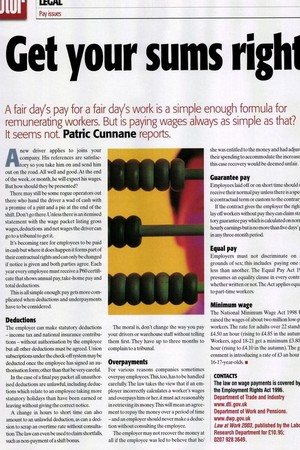Get your sums righl
Page 38

If you've noticed an error in this article please click here to report it so we can fix it.
A fair day's pay for a fair day's work is a simple enough formula for
remunerating workers. But is paying wages always as simple as that?
It seems not. Patric Cunnane reports.
Anew driver applies to joins your company. His references are satisfactory so you take him on and send him out on the road. All well and good. At the end of the week, or month, he will expect his wages. But how should they be presented?
There may still be some rogue operators out there who hand the driver a wad of cash with a promise of a pint and a pie at the end of the shift. Don't go there. Unless there is an itemised statement with the wage packet listing gross wages, deductions and net wages the driver can go to a tribunal to get it.
It's becoming rare for employees to be paid in cash but where it does happen it forms part of their contractual rights and can only be changed if notice is given and both parties agree. Each year every employee must receive a P60 certificate that shows annual pay, take-home pay and total deductions.
This is all simple enough: pay gets more complicated when deductions and underpayments have to be considered. Deductions
The employer can make statutory deductions — income tax and national insurance contributions — without authorisation by the employee but all other deductions must be agreed. Union subscriptions under the check-off system may be deducted once the employee has signed an authorisation form; other than that be very careful.
In the case of a final pay packet all unauthorised deductions are unlawful, including deductions which relate to an employee taking more statutory holidays than have been earned or leaving without giving the correct notice.
A change in hours to short time can also amount to an unlawful deduction, as can a decision to scrap an overtime rate without consultation.The law can even be used to claim shortfalls, such as non-payment of a shift bonus.
The moral is, don't change the way you pay your drivers or warehouse staff without telling them first. They have up to three months to complain to a tribunal. Overpayments
For various reasons companies sometimes overpay employees.This, too, has to be handled carefully. The law takes the view that if an employer incorrectly calculates a worker's wages and overpays him or her, it must act reasonably in retrieving its money.This will mean an agreement to repay the money over a period of time — and an employer should never make a deduction without consulting the employee. The employer may not recover the money at all if the employee was led to believe that he/
she was entitled to the money and had adjus their spending to accommodate the increase this case recovery would be deemed unfair. Guarantee pay
Employees laid off or on short time should: receive their normal pay unless there is a spe ic contractual term or custom to the contrar.
If the contract gives the employer the righi lay off workers without pay they can claim sta tory guarantee pay which is calculated on non hourly earnings but is no more than five days' j in any three-month period. Equal pay
Employers must not discriminate on 1 grounds of sex; this includes paying one less than another. The Equal Pay Act V. presumes an equality clause in every contn whether written or not.The Act applies equi to part-time workers. Minimum wage The National Minimum Wage Act 1998 I raised the wages of about two million low-p workers. The rate for adults over 22 stand; £4.50 an hour (rising to £4.85 in the auturr Workers, aged 18-21 get a minimum £3.80 hour (rising to £4.10 in the autumn). The g emment is introducing a rate of £3 an hour 16-17-year-olds. • CONTACTS The law on wage payments is covered by the Employment Rights Act 1996. Department of Trade and Industry www.dti.gov.uk Department of Work and Pensions. www.dwp.gov.uk
Law at Work 2003, published by the Lab( Research Department for £10.95; 0207 928 3649.






































































































